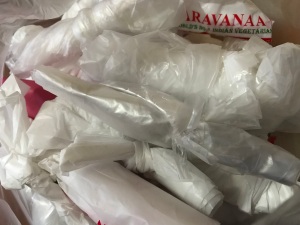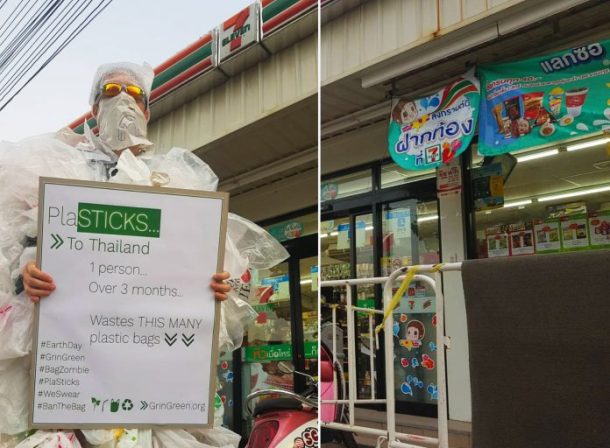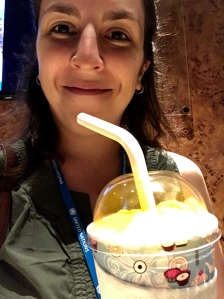I made a half-assed effort to be environmentally-conscious my first month in Bangkok. I brought one reusable grocery bag with me from the U.S. that I intended to use daily here, but I didn’t always remember it. I bought plastic water bottles because they were safe and convenient. Sometimes the nice people at 7 Eleven slipped straws into the bag with them. I never used the straws nor could I recycle them. I did bring a storage container to lunch every day in case of leftovers, but that’s a small success at best.
A couple of nights ago, I was watching “Cooked” on Netflix while making dinner. In the second episode, the documentary deals with the plastic-packaged food that has overwhelmed the Indian market in recent years. Michael Pollen says something in the film about how the U.S. became major producers and consumers of ready-to-eat, plastic-packaged products and then dumped the habit onto countries with lower GDP per capita. In the documentary, he explores how this led to a shift away from cooking which has contributed to obesity and a host of other problems. Putting aside the issues many of us have with Pollan…his statement made me consider my plastic consumption as an American in Thailand.

It took me an additional episode of “Cooked” to roll and consolidate my 35 plastic bags.
As I said, I’ve been doing a half-assed job so far. I’d like to do right for the world I live in, but if I’m honest I only do so when it’s convenient for me. After the episode that night, I was curious about my own consumption so I counted the plastic bags I have accumulated since I arrived in Bangkok. Even though I brought my reusable bag with me every time I went for groceries and, more often than not, on my trips to the market and 7 Eleven, I still managed to accumulate thirty-five plastic bags. That’s one bag for each day I’ve been here!
To put that in perspective, a single person in Bangkok uses 600 bags over three months. I’m using about 20% of the average, but those numbers don’t make me feel good! I can do a lot better with just a little more effort. Not perfect, but certainly better.
I was reminded of that a couple weeks ago when an awesome youth-led NGO in Bangkok, Grin Green International, came to the UN to talk about the environmental impact of single-use plastics. These teens are raising awareness all over the city and calling for Thailand to join the list of countries moving away from plastic bags and leading the way in conservation in the region. Well, them and their “plastic bag monster.”

The “plastic bag monster” hits 7 Eleven!
The awareness-raising they’re doing is especially important because it’s hard to discipline ourselves, as humans, to make environmentally-conscious decisions. Shankar Vedantum has a great episode of Hidden Brain about this. Basically, our brains are wired to engage in counterfactual thinking that allows us to make better decisions for those around us only if certain factors are met. It only works when we are immediately impacted by something negative that we see as the central result of our actions. Our brains do not wire this way with climate change because the impact seems disconnected and happens over a long time. In a case like that, we must draw the connections ourselves as countries, organizations, and individuals.
Last week, the UN took a step in this direction. They stopped distributing plastic take-away containers and straws. I am now the proud owner of a reusable straw and continue to diligently bring my storage container to work.

Of course, it’s complex for organizations to make these moves because their distribution of plastics impacts both the environment and their service users (in positive and negative ways). One important example is how banning plastic straws impacts people with disabilities. Plastic straws are necessary for some people with disabilities to enjoy public services, so businesses have to be intentional and thoughtful about how to handle this in the most responsible way.
On an individual level, it comes down to you. Are you willing to stop being a convenient environmentalist? I am going to try.
As for my 35 bags? If I can’t recycle them here, they’re coming back to the U.S. with me. I know it would be easy to toss them in the trash and forget about it, but when I take a moment to consider where they are headed after that, the choice is easy.


What an interesting adventure you must be having! Good for you for doing your part.
Thanks! Constantly learning and unlearning here 🙂
In an attempt to reduce my environmental footprint, I’ve taken up giving my barista a travel mug for my morning coffees and using the recycle bin as intended at both work and home. Imagine my surprise when I found out that the recycle bins are just put into landfill because my city can’t afford the steep prices for recycling! I think there is a great renewed focus on reducing waste now, but we could all be even more aware of how we can help. I haven’t watched the episode you speak of so I do find myself lost in places here, but I definitely appreciate the talking point. 🙂
Wow, i had no idea about the bins! There’s so much to be learned about the specifics of recycling wherever we live. Thanks for reading and for your feedback, especially about the references. It’s very helpful!
Thanks for the reminder – I know I’m guilty of succumbing to laziness over less convenient environmentally friendly options. (I’m particularly guilty of obscenely long showers, sending way too much water down the drain.)
Yes! Absolutely! That’s another important habit thar impacts the environment. Thanks for reading!
You raise such important issues in this piece and give the reader much to mull over. Posing the issues as your approach, how you’re tackling consumption and waste, worked well to avoid any preachiness from creeping in. You gave the reader the latitude to think about how they might make changes too.
Thanks so much for the thoughtful reflections and feedback. I’m glad to hear that’s how it came across!
I really enjoyed reading this, especially as someone who is a half-assed environmentalist at best. I try, but I’m not as good as I’d like to be.
Thanks for reading! Glad to hear it resonated with another half-asser.